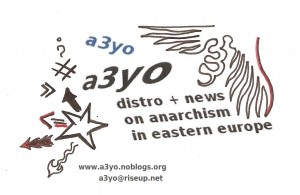(source: http://www.themoscowtimes.com/opinion/article/kazakh-massacre-cover-up/459351.html)
Six people were convicted last week for instigating riots on Dec. 16 in the Kazakh city of Zhanaozen. Kazakh leaders and prosecutors claimed all along that the massacre was organized by “a group of former oil workers aided by a number of young people,” but this is patently untrue. Even the European Parliament in early March “strongly condemned the violent crackdown by the police forces.”
The workers of Ozenmunaigaz and a neighboring oil company had been on a peaceful seven-month strike over wages and trade union recognition. Even before Dec. 16 they were attacked by riot police. In August, one of their leaders, Zhaksylyk Turbayev, was killed on his way to a union meeting, and a few weeks later the daughter of another activist was killed. Natalya Sokolova, their lawyer, was sentenced to six years in prison.In the absence of meaningful negotiations either by the employer or the government, the oil workers called for a peaceful demonstration on Dec. 16. They appealed for the resignation of Kazakh President Nursultan Nazarbayev and his government.
The authority’s response was decided in advance. According to his court testimony, a senior police officer was dispatched with police troops to Zhanaozen on Dec. 14. Instead of tear gas, rubber bullets or water cannons, weapons and live rounds were issued. Video footage from the conflict shows police firing into unarmed and peaceful protesters, often shooting people in the back. The government admits that 15 people were killed, while eyewitnesses say the number of victims is much higher — about 70. Nonetheless, no charges have been lodged against the interior minister, who said he had given the order to open fire.
Notably, not one policeman was seriously wounded in the conflict. This undermines the outrageous government claim that “oil workers attacked police officers and innocent bystanders.” It is clear that no attempt was made to use ordinary crowd-control methods, such as tear gas and water cannons. Instead, riot police using automatic weapons opened fire without warning on the unarmed crowd.
Sentences of three to seven years are now being handed down for the 49 oil workers on trial, several of whom had friends and family members killed in the massacre. Yet an incredible picture has emerged during the trials, during which defendants testified about how security forces imposed a curfew and reign of terror, arresting all they thought were linked to the strike.
One defendant, Kairat Edilov, testified that he was offered protection by the police if he agreed to give evidence against 15 others. After refusing, he said the police beat him, covering his head with a bag and nearly suffocating him. He claimed his investigator, Bakyt Mendybayev, put a pistol to his head several times. Other prisoners testified how they had been stripped naked, thrown outside and periodically doused with cold water when temperatures were minus 15 degrees Celsius.
One prosecution witness testified that he had helped one defendant to loot an ATM. But a day later, he returned to testify under his real name and retracted his earlier statement. Explaining his false testimony, he said he was beaten by the police after his arrest on Dec. 27. “I shook all night from fear and cold,” he said. “I couldn’t get hold of myself. I asked the investigator where I should go because the city was under curfew. On my way home, I was again arrested by soldiers. They were in masks and started beating me again.” The police, he said, had threatened to suffocate him with a plastic bag if he did not follow their instructions.
In April, Human Rights Watch issued the following statement: “Kazakhstan needs to show that it has a zero-tolerance policy toward torture by suspending the trial and conducting an immediate, impartial and effective investigation.” Yet on May 11, the Prosecutor General’s Office demanded long prison sentences for those currently on trial.
The Kazakh prosecutor general recently said it is important that “our international partners are able to see that justice is being done.” Yet the government recently refused visas to a delegation led by Paul Murphy, member of the European Parliament, to visit Aktau.
The attempt to blame the Zhanaozen massacre on the strikers without bringing the law enforecement officials who were responsible for the killings and subsequent beatings and torture to justice shows how far Kazakhstan’s authoritarian regime is willing to brutalize its citizens.
The Moscow Times



